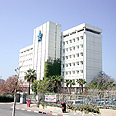
Tel Aviv University
צילום: ניב קלדרון
'Israel being ostracized'
British-Jewish academic, speaking before boycott vote, says 'there's something in the air in the UK, boycott will lead to anti-Semitism'
Hours before members of the University and College Union (UCU) gather in Bournemouth, southern England, to vote on a motion calling for a boycott of Israeli academic institutions, British-Jewish academics told Ynetnews they expected the vote to be close, adding that it could "could go either way."
"I really don't know what will happen," said Ronnie Fraser, Chairman of the Academic Friends of Israel. "Sally Hunter (Joint Secretary General of UCU) has just spoken, coming out against a boycott. But there are too many unknowns."
British academic unions have flirted with boycotts of Israel on a number of occasions in the past few years, and in 2005, the Association of University Teachers (AUT) passed an Israel boycott motion. It was overturned shortly afterwards.
Anti-Semitic attitudes
Eve Garrard, a Senior Lecturer in professional ethics at the University of Keele, will speak during the conference, and attempt to convince UCU members to vote against the motion."I'm planning to say that the standard justifications for a boycott of Israel are thoroughly inadequate," she said. "No sound reason has been given for singling out Israel. I'm not going to offer explanations myself for why Israel is being singled out, but it needs an explanation," she added.
"What needs explaining is not criticism of Israel but it being singled it out for special ostracism and exclusion," Garrard said, adding: "The likely effect of a boycott will be anti-Semitism. The nature of the boycott is to call for ostracism and exclusion, which are also standard anti-Semitic attitudes."
"I hope it won't be passed but it's possible it will be. There's something in air in the UK at the moment," Garrard said," citing other anti-Israel boycotts and petitions being initiated by Britain's National Union of Journalists, an architect's union, and a public service union.
"Most academics don't think about this at all. But there are few activists tend to dominate," Garrard said. She added that "several non-Jewish academics are involved in trying to fight against the boycott."
Israel singled out
In Israel, the boycott debate was dismissed by Professor Menachem Kellner, Professor of Jewish Thought at Haifa University."I'm very disappointed by the British," he said. "This whole story is not serious. I know that a large percentage of those voting don't have a clue what's happening here in the Middle East. Although they're academics, they swallow rhetoric without checking it though," he added.
Writing on a website of Left-wing academics opposed to the boycott, known as Engage, David Hirsch, a lecturer in Sociology at Goldsmiths College, London, said: "The hard core of the boycott campaign will be in Bournemouth for the conference, pushing its simplistic and one sided certainties. Regardless of what happens at the conference, the boycott campaign won't stop; it'll be back year after year after year. It will always find one or two little rump branches to send a boycott motion to conference and it will always find a handful of union members willing to justify it."
He added: "The boycott campaign is not really about what happens in the Middle East but about what happens in our unions, on our campuses and in our public discourse.... The damage that it does in the UK is to leave the door open for anti-semitic interpretation... Israel is far from being the most serious human rights abuser on the planet and yet it is singled out."










